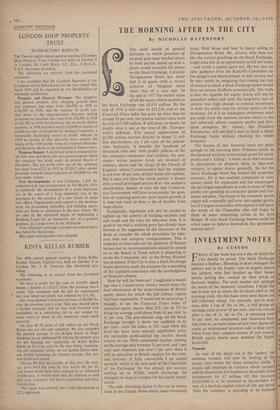THE MORNING AFTER IN THE CITY
By NICHOLAS DAVENPORT THE most sordid of general elections, in which promises of material gain were bandied about by both parties, ended up with a pretty sordid scramble for shares on the Stock Exchange. Certainly Throgmorton Street has never had it so good—with a record turnover of 'bargains' three times that of a year ago. At the end of 1957 the market value of all the equity shares quoted on the Stock Exchange was £8,834 million. By the end of 1958 it had risen to £12,210, and as the Financial Times index has gone up since then by around 30 per cent. the present market value must be over £15,500 million. It will soon, no doubt, be double what it was at the time of Mr. Thorney- croft's deflation. This capital appreciation of £6,700 million accrues directly to about 24 mil- lion shareholders, say 5 per cent. of the popula- tion. Indirectly, it benefits the hundreds of thousands who own 'with profits' policies of the life assurance companies and societies, the pen- sioners whose pension funds are invested in ordinary shares and the clergy of the Church of England, whose Commissioners had the wisdom to put over 40 per cent. of their funds into equities. But it does not bless the whole nation; it blesses only a small privileged section of it—the ordinary shareholders. Sooner or later the new Conserva- tive Government will have to reconsider the ques- tion of imposing some tax upon capital growth, if it does not want to have a lot of trouble from wage claims.
Incidentally, legislation will also be needed to tighten up the control of building societies and unit trusts and the rules for take-over bids. It is good to see that a working party has already been formed at thesuggestion of the Governor of the Bank to consider the whole procedure for take- over bids and company amalgamations. This is expected to issue rules for the guidance of finance houses and its recommendations should be passed on to the Board of Trade which is preparing to revise the Companies Act, as the Prime Minister has promised. If the City is wise, a Stock Exchange boom should be made the occasion for a searching of the capitalist conscience and the promulgation of financial reforms.
How far will the boom go? I suggested a month ago that a Conservative victory would mean the final elimination of the undervaluation of British equity shares for which the last Labour regime had been responsible. It would not be surprising, I thought, to see the Financial Times index of industrial equity shares, then 255, rise to 323 to bring the average yield down from 41 per cent. to 3/ per cent. The post-election orgy on the Stock Exchange brought it down too suddenly to 41 per cent.—with the index at 285—and when this level has been more soundly established (after the inevitable profit-taking) the market should resume its rise. With continental equities yielding on the average only between 24 per cent. and 3 per cent. and American just over 3 per cent. there is still an attraction in British equities for the over- seas investor. A fully convertible £ on capital account, which is the next goat of the Chancellor of the Exchequer (he has already got security sterling up to $2.80), would encourage the foreigner to shop in London for his equity invest- ments.
The only disturbing factor is the rise in money rates in the United States which could eventually
bre4k Wall Street and lead to heavy selling, in Throgmorton Street. Mr. Amory, who does not like the current gambling on the Stock Exchange, might seize this as an opportunity to kill the boom —and avoid a capital gains tax. He has had no clear guidance from the Radcliffe Committee on the dangers and disadvantages of dear money and he may rashly be imagining that raising the rate of interest to check a Stock Exchange boom would have no serious ill-effects economically. The truth is that the appetite for equity shares will not be quenched unless and until the long-term rate of interest rises high enough to restrain investment in both the public and the private sectors of the economy, for it is an inadequate investment total put aside from the national income which in the end adversely affects company profits and divi- dend prospects. Mr. Amory, like President Eisenhower, will not find it easy to check a Stock Exchange boom without checking the whole economy.
The lessons of this financial spree are plain enough on the morning after. Freedom works in the financial markets to encourage greed for quick profits and a 'killing' : it leads on to wild excesses in speculation—in property deals, in take-over mergers, in equity shares generally. So far the Stock Exchange boom has helped the economic recovery, for it has enabled companies to .raise money easily for expansion and has encouraged the privileged speculators to cash in some of their profits for spending on consumer goods and con- sumer durables. The boom in the consumer goods trades will eventually spill over into capital goods. but if it begins to interfere with exports it will incur the wrath of the Chancellor who will begin to think of some restraining action in his next Budget. If only Stock Exchange booms could be relied upon to behave themselves like gentlemen and not spivs!






































 Previous page
Previous page